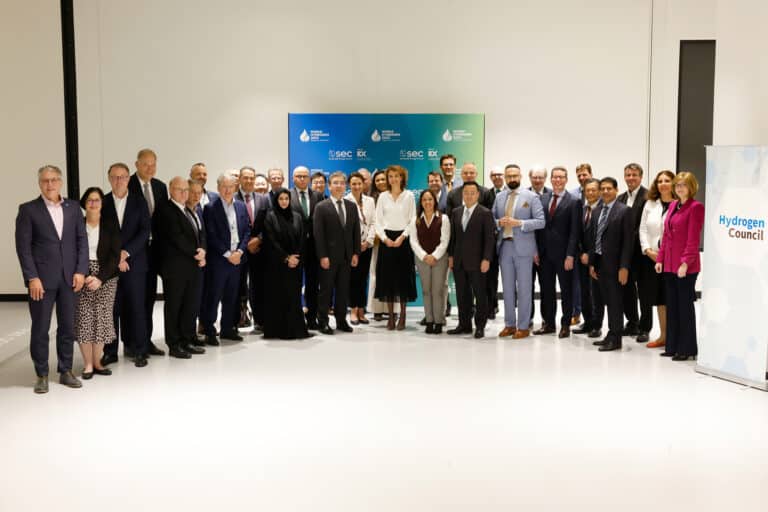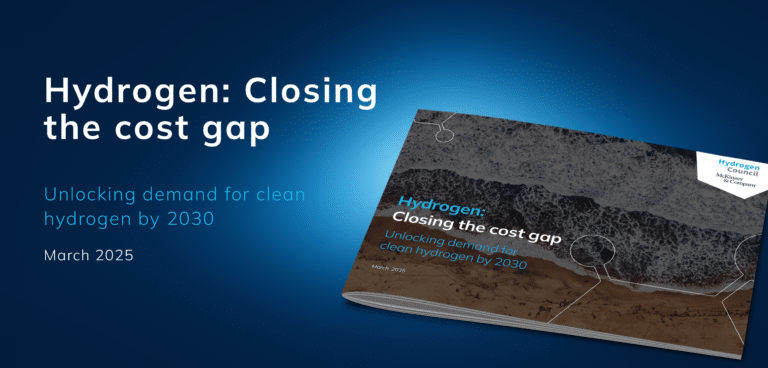In 2017, Air Liquide founded the Hydrogen Council in collaboration with Toyota. Why was it important to create this world first, CEO-led initiative?
Hydrogen is a major solution to fight climate change and to decarbonize among the most emitting sectors, namely industry and mobility. Air Liquide and Toyota have always believed in the potential of this molecule to tackle this challenge, at a time when few did.
At the beginning, it was primarily a matter of putting hydrogen on the agenda of politicians and investors. This led to the creation in January 2017 of the Hydrogen Council, with 11 other industrial players. Very quickly, the topic became strategic for many stakeholders. One of the reasons for its success is probably because the Hydrogen Council has brought together complementary expertise from different sectors all over the world.
In what way would you say the Hydrogen Council has evolved?
The Hydrogen Council has become a force to be reckoned with. With close to 150 members today, the Hydrogen Council’s ever-diversifying membership reflects the breadth of sectors and geographies in which hydrogen can play an essential role. Data analysis, scientific know-how, technological expertise, regulatory knowledge… All these competencies provide rich in-depth studies and a quite unique comprehensive vision of what it takes to build a whole sector and its ecosystem.
For the past years, the Hydrogen Council has played an active role not only in raising awareness among public authorities around the world but also in highlighting the way policies and regulations could impact the development of infrastructures and hydrogen usages. Today, around 40 countries have now announced a hydrogen strategy. $240 billion worth of investment* have been announced by companies and countries. This figure could be tripled by 2030.
Can you tell us about Air Liquide’s ambitions toward hydrogen?
As a pioneer and a leader in hydrogen development, Air Liquide has committed to invest €8 billion worldwide in the low-carbon hydrogen value chain by 2035. The Group has also planned 3 GW of electrolysis capacity to be deployed by 2030.
Many projects across the world are underway to drastically increase the Group’s production capacities in renewable and low-carbon hydrogen. In 2023, an electrolyser with a 30 MW capacity will be commissioned in Germany. We will scale-up even more in 2025 with the Air Liquide Normand’Hy’s project in France: a 200 MW electrolyzer that will feed with renewable hydrogen our industrial customers in the region but also serve heavy-duty mobility.
At the same time, Air Liquide is multiplying its partnerships with major companies across the world to build a global hydrogen economy: energy players, equipment manufacturers, infrastructure operators… It’s only by working together that we can achieve the necessary transition and build a hydrogen economy.
As momentum for hydrogen continues to grow, what are the areas of focus for the Hydrogen Council in 2023?
2022 gave an unprecedented stimulus to low-carbon and renewable hydrogen. Now is the time to scale up. Investment, policy and infrastructure – these are three major challenges on the way to building the hydrogen economy today. These areas are precisely where the Hydrogen Council can make a difference.
What differentiates the Hydrogen Council is the personal implication of its members, at the highest level of their organizations. What collectively drives us is not only a common conviction of the key role of hydrogen in the energy transition, but more importantly the fact that we need all the bricks of the ecosystem to align for hydrogen to become a reality. More than ever, we need to accelerate if we want to make the 2020s the hydrogen decade. It is up to us to transform this vision into a global reality.
* Source McKinsey & Company study for the Hydrogen Council Hydrogen Insights 2022
About The Hydrogen Council
The Hydrogen Council is a global CEO-led initiative that brings together leading companies with a united vision and long-term ambition for hydrogen to foster the clean energy transition. The Council believes that hydrogen has a key role to play in reaching our global decarbonization goals by helping to diversify energy sources worldwide, foster business and technological innovation as drivers for long-term economic growth, and decarbonize hard-to-abate sectors.
Using its global reach to promote collaboration between governments, industry and investors, the Council provides guidance on accelerating the deployment of hydrogen solutions around the world. It also acts as a business marketplace, bringing together a diverse group of 140+ companies based in 20+ countries across the entire hydrogen value chain, including large multinationals, innovative SMEs, and investors.
The Hydrogen Council also serves as a resource for safety standards and an interlocutor for the investment community, while identifying opportunities for regulatory advocacy in key geographies.
To find out more visit www.hydrogencouncil.com and follow us on Twitter @HydrogenCouncil and LinkedIn.
Joanna Sampson, Communications Manager, Hydrogen Council
joanna.sampson@hydrogencouncouncil.com



